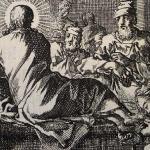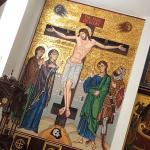 Easter just took place globally with Pascha still to come for the Orthodox. This is a weekend of history, but also of mystery.
Easter just took place globally with Pascha still to come for the Orthodox. This is a weekend of history, but also of mystery.
What’s a mystery?
A mystery is not mere woo, an assertion based on a feeling, power, or rhetoric. That’s a bad way to live life: check with any ethicist. Finding the good life based on our immediate desires is a great way to become a terrible person. (Lord have mercy!) Ancient people afraid of the after life (scary!) invented atheism as a comfort, but that did not make atheism true. The Chinese government has the power to make secularism an attractive option and unlimited money to spend on atheist rhetoric, but truth seekers pick theism all the time. Wanting a thing to be true, even wanting it badly (who wants to die?), is not a good reason to believe it.
A mystery is not irrational: do not believe irrational ideas. Ask any therapist. An idea might be hard to understand without being irrational. Heraclitus said: “The way up is the way down.” That curmudgeonly philosopher was not being irrational just tricksy. He could have meant something like: “To see the truth (the upward way), one has first to look at nature (the downward way). However, so far as I know “zero is the way the best thing is that you was a great day” means nothing. I formed it by taking the middle word option on my iPad as I entered text. A meaningless sentence is not worthy of belief.
A mystery is not believing despite the evidence. Talk to a epistemologist about bad thinking: think better! If thinking clearly, consider that one should be open to all the evidence. If God exists and is not silent, then we must consider what God has to say.*
What is a mystery?
A mystery is a truth revealed to us that we could not have learned without help. Imagine a person who is not mentally capable of doing certain proofs in logic from start to finish. The teacher comes and gives him the proof and then the student is able to trace the moves made from line to line. He understands the proof is valid, even if he could not have done the proof (ever!) without the revelation from the teacher. The student understands without discovering.
The cosmos is a vast place made by a God who keeps every detail in mind to bring the best outcome to us. Every action is interconnected, past and present with future implications. Humans cannot know all the variables, but God can show us His nature (good), the complexity, and an image of the final outcome (good). We can learn truths that we could not have reached by unaided human reason, but those truths (once learned) work, fit reality, and make sense of our experience.
Once we know, then we can see the place this truth plays in reality. This is particularly true of the mystery of the Lord’s Supper. Jesus says: eat and drink. We see one thing and yet know there is a deeper reality: the bread is bread and The Body of Christ, the cup is filled with wine and the Blood of Christ. We would not know this sacrament if Jesus had not revealed this mystery to us. Once we know, once we eat and drink and experience the miracle, then we see.
Plato described the slow steps of human reason toward the Good in his Republic. He pointed out that if we could reach a vision of the Good as Good, then that truth would leave us unable to (truly) doubt what we had seen. This would allow us to fill in the steps or leaps. Of course, most of us never get that clear a vision, our faith is faith not yet certainty, revelation is rational, but not indubitable, not yet.
When I stand before my pastor tonight, the night we remember the revelation of the Mystery, I come as someone who started life badly. I will come as I am, wanting to continue to become what I should be. I will take bread and wine and they will taste like bread and wine, but also continue a process of becoming like God.
This theosis will not end until I see Him face to face: the ultimate revelation of the mystery of God.
—————————-
*I deal with over fifty questions from an atheist if you want to know my general approach to skeptics.
















